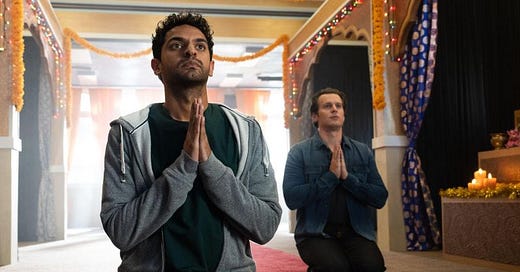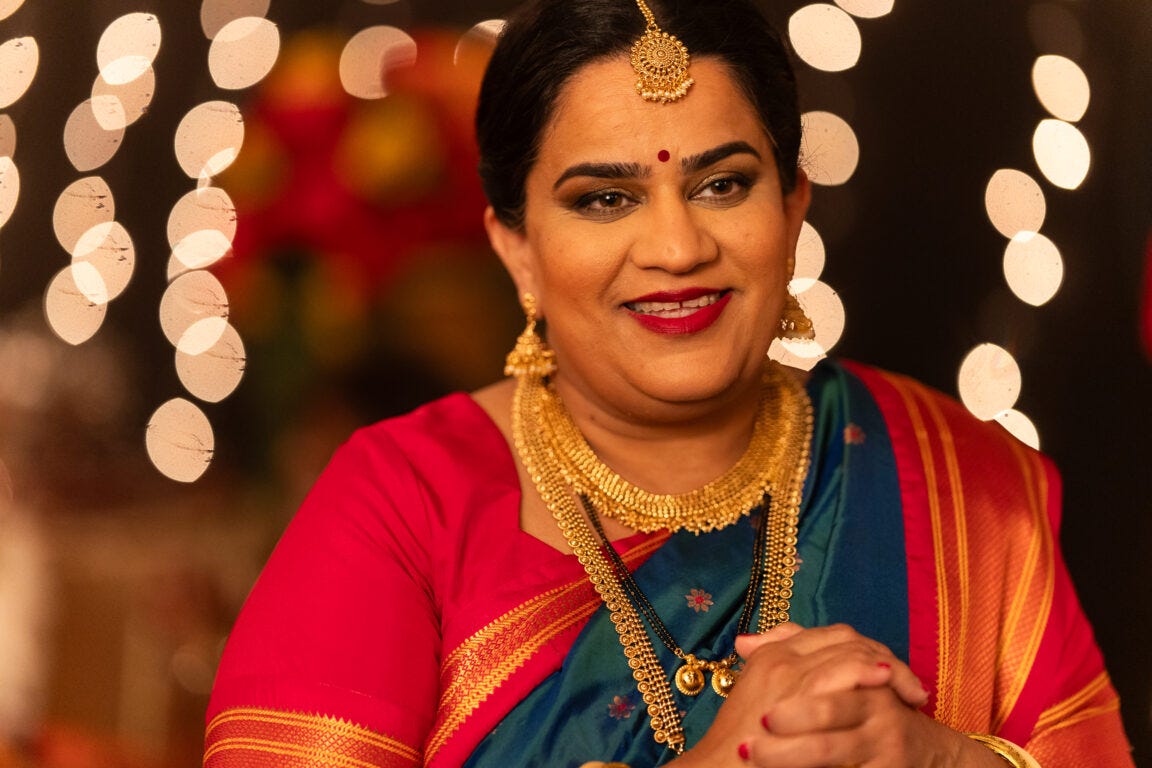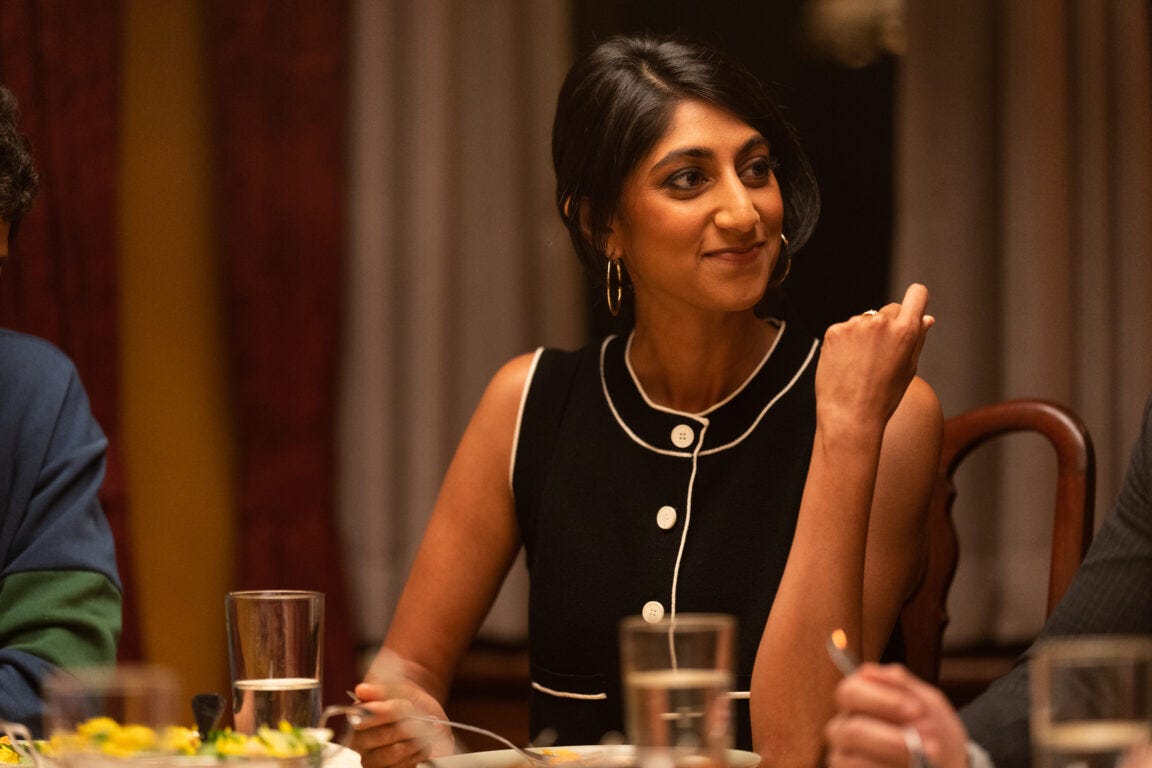A Nice Indian Boy (2024)
Steadfast love powers through cultural clashes in this sweet gay romance
A Nice Indian Boy (2024)
In theaters
A gay rom-com. Okay, guy meets guy. No biggie, especially these days.
Naveen Gavasjkar (Karan Soni), a gay, awkward and lonely 30-year-old Indian ER doctor in Vancouver, is out, but the “relationship thing” still isn’t happening for him. He wonders if it ever will.
He maintains a tenuous connection to Indian culture and occasionally drops in to a small Hindu temple.
There we see him kneel, fold his hands, close his eyes and chant with what looks more like anxiety than conviction. Is he hoping that Ganesha, the Hindu deity with the elephant head we see on the wall, called “the god of wisdom” and “the remover of obstacles”, will send along the right guy?
As Fats Waller sings, One never knows, do one?
One day, as Naveen worships alone in the temple, a white man kneels a few feet behind him, chants briefly, rises, rings a ceremonial bell and quietly leaves. Naveen barely notices, but in their solemnity both men seem to be wordlessly signaling one another.
On his next visit, Naveen is again kneeling and beseeching alone, when the same white man enters, kneels behind him, performs his own ritual and again vanishes without a word. But this time Naveen opens his eyes with wonder and turns to catch a glimpse of his fellow-supplicant. A smile and a sense of lightness fill his face.
The hospital where Naveen works needs new staff photos taken, and who should be doing the snapping but Jay Kurundkar (Jonathan Groff), an openly gay freelance photographer. The two men sheepishly recognize one another, and Jay nervously asks Naveen out on a date. Recalling the temple vibe, Naveen stumblingly says yes.
On their first date, they see a movie, the 1995 romantic Bollywood drama Dilwale Dulhania Le Jayenge (known to Indians worldwide as DDLJ), and afterwards Jay can’t hold back his budding affection for his newfound Indian friend.
He explains that he was adopted and raised by Indian parents, devout Hindus who’ve since passed away. He and Naveen, he eagerly points out, share a cultural identity, not just a sexual one.
As proof, he stops in the street to sing a rapturous DDLJ love song, rhythmically tapping his hands across his body. It feels too much like a serenade, and the startled Naveen is embarrassed. This white guy seems to be more Indian than he is.
But this charming love quest is suddenly in motion. It starts out guy meets guy, and they bond as a couple – but the crux of the matter is guy meets other guy’s family.
Naveen and Jay’s partnering brings to the surface this family’s festering, unasked question: Can they make any marriage, arranged or not, work?
Both admit they long for a traditional Indian wedding, and over dinner with friends they hastily declare themselves engaged.
Soni and Groff portray these two men’s doubts and insecurities with a deft lightheartedness. They make falling in love look tremulous, gangly and sweet.
But not easy. Naveen hasn’t introduced Jay, or in fact any of his previous boyfriends, to his family. They “haven’t actually seen me be gay,” he confesses to Jay.
Comedian Zarna Garg conveys warmth and wry wisdom as Naveen’s understanding mother
His mother Megha (Zarna Garg, a gifted comedian making her acting debut) and younger married sister Arundhathi (Sunita Mani) have long since accepted Naveen as gay. His father Archit (Harish Patel) is still struggling with his son’s sexual identity.
Even so, Dad and the other family members all wonder when he’s going to settle down with a nice Indian boy. And what does Naveen bring home? they unabashedly ask the couple out loud. A nice white boy. His sexuality isn’t an issue; that they expected.
But his race and social standing require careful consideration. Okay, he’s certainly been raised “Indian” and is a practicing Hindu. But isn’t “freelance photographer”, the family wonders, code for “unemployed”?
No, says Jay confidently. An exhibition of his photos has just opened, and he hopes the whole family will come and have a look. They do and find the wide variety of large, crisply saturated photos impressive. Naveen hasn’t seen his lover’s work laid out so auspiciously, and he, too, is awed.
Meeting the Indian family: a nervous Jay and Naveen wonder if Jay will be accepted
But his father, Archit, waits in the car. An actual wedding to this man will mean his son’s sexuality is no longer in the slightest doubt, and for Archit that final acceptance isn’t easy.
The family is actually wrestling with its own, deeply suppressed demons. Megha and Archit’s marriage was arranged; as youths, they were complete strangers to one another and have settled over the years into what their daughter Arundhathi cruelly calls a “loveless” match. She’s wrong, as we’ll learn.
But Arundhathi admits that she speaks out of bitterness, since her own troubled – also arranged – marriage to a successful Indian surgeon is headed for divorce. Let Naveen have his marriage to a white boy, she admonishes her parents. Since no one’s forcing them into marriage, maybe theirs stands a better chance than hers.
Naveen’s sister Arundhathi (Sunita Mani) helps her brother treasure the love he’s found
Giving voice to this profound cultural problem is how Eric Randall’s script, from the play of the same name by Canadian playwright Madhuri Shekar, comes into its own.
Most urgently, this isn’t a story about love between two men. We see they’re not a perfect match, but with support they stand a chance. We’ve seen similar odds proposed in countless rom-coms.
But Naveen and Jay’s partnering brings to the surface this family’s festering, unasked question: Can they make any marriage, arranged or not, work?
For these five people the Indian wedding, including its long-honored dance of each family welcoming a new member, is the signpost for a happy marriage. Since Jay’s parents are deceased, Naveen’s family has to summon the guts to welcome the white boy, who embraces their culture as deeply as they do, into their far from perfect family.
He proves to be a very nice Indian boy after all, though one might not suspect it to look at him.
Director Roshan Sethi (Soni’s partner in real life) guides his actors through their characters’ prickliness to a place where Naveen’s family just might at last be able to celebrate with heart a genuine unforced marriage.
The freewheeling touch of comedian Mindy Kaling, one of the producers, is evident in the movie’s spiky, warm humor. And Tony-winner Groff — currently showing his versatility on Broadway in Just in Time, a new musical about the life of singer Bobby Darren — is perfectly cast here.
Color, culture and consciousness have been said to distinguish one group from another. And those markers always need to be respected.
But they can also be knit together if patience and understanding are brought to bear. That’s the dance being danced here. It looked mighty appealing to me.







